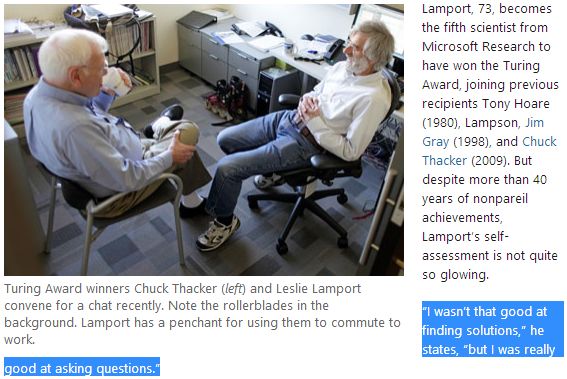First I admit I myself am not a good questioner, especially in large lectures.
But I do realize the importance of asking questions as a means of learning and doing research, and encourage my students to do so (how?).
Here is a good article that may motivate you in that direction (see the bottom of the exerpt). This is on Leslie Lamport, this year’s Turing Award winner.

(excerpt is from http://research.microsoft.com/en-us/news/features/lamport-031814.aspx)
With Emacs you are expected to have it open 24/7 and live inside the program, almost everything you do can be done from there. You write your own extensions, use it for note taking, organisation, games, programming, shell access, file access, listening to music, web browsing. It takes weeks and weeks till you will be happy with it and then you will learn new stuff all the time. You will be annoyed when you don’t have access to it and constantly change your config. You won’t be able to use other people’s Emacs versions easily and it won’t just be installed. It uses Lisp, which is great. You can make it into anything you want it to be. (anything, at all)
With vim, it’s almost always pre-installed. It’s fast. You open up a file, do a quick edit and then quit. You can work with the basic setup if you are on someone else’s machine. It’s not quite so editable; but it’s still far better than most text editors. It recognises that most of the time you are reading/editing not typing and makes that portion faster. You don’t suffer from emacs pinkie. It’s not so infuriating. It’s easier to learn.
Even though I use Emacs all day every day (and love it) unless you intend to spend a lot of time in the program you choose I would pick vim
via http://stackoverflow.com/a/1433315
The best summary that I have seen on the differences between the two editors. Conclusion? You need both!
Here are some of Crawford’s tips for maximizing writing work habits:
- Create a routine
- Minimize distractions
- Controlled daydreaming
- Beware of empty praise or destructive criticism
- Open your avenues of opportunity
I agree that it’s more of a habit than of one’s ability or anything else.
via http://menwithpens.ca/efficient-writing-effective-work-habits/
Why sometimes can’t I connect to ecl.unist.ac.kr or some other UNIST sites?
Most likely, the server is fine, but the DNS (Domain Name Server) setting has a problem.
Then how should I fix it?
The short answer is to use the primary DNS only: 10.0.2.204, or if you must use the secondary as well, try this: 10.0.2.220.
According to the DNS Setting Guide, 2009.8 version, the primary DNS of UNIST is 10.0.2.204, and the secondary is 114.70.1.52. Or if you use WUNIST_AAA (campus-wide wireless network) the secondary DNS is 10.0.2.205. Those secondary DNS servers all have problems. The 114.70.1.52 server returns external IPs for internal server domains, which don’t work more often than it do. The 10.0.2.205 server doesn’t work at all. So the solution is just to remove the secondary DNS, and use the primary only.
What if I’m using DHCP — for example, WUNIST_AAA? Then you can’t get rid of 10.0.2.205, but it should be fine because 10.0.2.205 doesn’t return anything, so your computer will try the primary only anyway.
The best method, which is also recommended by Michael Shell, is to use this:
\enlargethispage{-X.Yin}
somewhere at the top of the first column of the last page. The last page gets effectively shortened by the “X.Yin” amount.
